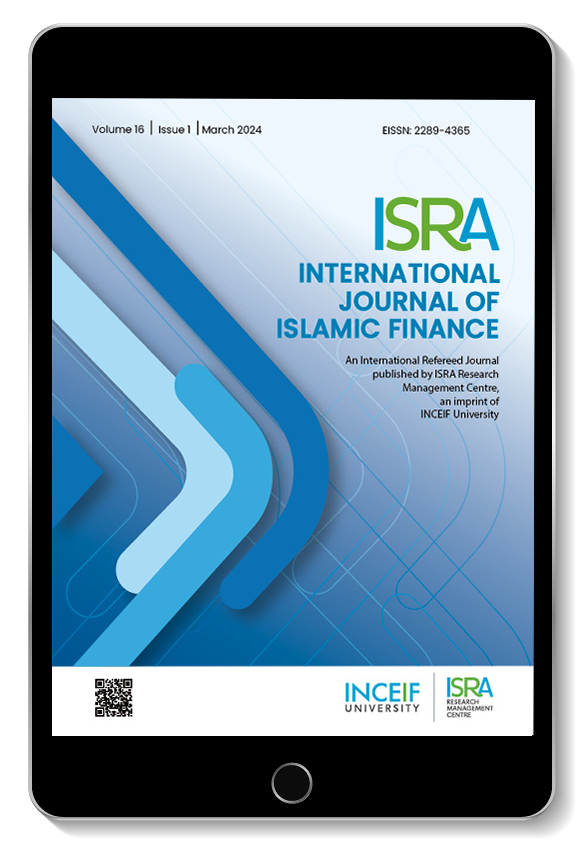投资者情绪、2019冠状病毒病大流行和印度尼西亚伊斯兰股票回报波动
IF 1.4
Q2 BUSINESS, FINANCE
引用次数: 0
摘要
目的-本研究旨在调查以消费者信心指数(CCI)衡量的投资者情绪的影响,以及COVID-19对以印度尼西亚伊斯兰教股票指数(ISSI)代表的伊斯兰教股票回报波动的影响。设计/方法/方法-本研究采用GARCH(1,1)模型,使用2011年7月至2021年12月的月度数据,测试投资者情绪和COVID-19对伊斯兰股票回报波动性的影响。 研究结果-本研究的结果表明,投资者情绪负向影响波动性的伊斯兰股票收益;而2019冠状病毒病(COVID-19)对伊斯兰股票回报波动率产生了高度且持续的影响。 原创性/价值-对伊斯兰资本市场(ICM)的投资者行为和波动性的研究是有限的。投资者情绪是预测股票收益波动水平的重要变量。投资者必须了解全球正在发生的重大事件,例如COVID-19。本研究特别关注印度尼西亚伊斯兰股票投资者的情绪。 研究局限性/影响-本研究使用传统GARCH模型进行方差分析,并且仅限于印度尼西亚的伊斯兰股票市场。仅评估了几个变量,特别是投资者情绪和COVID-19对股票回报波动的影响,使用的是月度数据。 实际意义——对市场波动的研究将极大地帮助投资者、公司和监管机构确定克服风险的策略。这项研究说明了投资者行为如何影响股票收益的变动。事实证明,一场全球事件,特别是2019冠状病毒病大流行,对国际综合管理机构的状况产生了重大影响。本文章由计算机程序翻译,如有差异,请以英文原文为准。
Investor Sentiments, the COVID-19 Pandemic and Islamic Stock Return Volatility in Indonesia
Purpose — This study aims to investigate the effect of investor sentiments, as measured by the Consumer Confidence Index (CCI), and the impact of COVID-19 on Islamic stock return volatility proxied by the Indonesia Sharia Stock Index (ISSI).
Design/Methodology/Approach — This study employs the GARCH (1,1) model to test the impact of investor sentiments and COVID-19 on the volatility of Islamic stock returns using monthly data from July 2011 to December 2021.
Findings — The findings of this study indicate that investor sentiments negatively impact the volatility of Islamic stock returns; while COVID-19 caused a high and persistent effect on Islamic stock return volatility.
Originality/Value — Research on investor behaviour and volatility in the Islamic capital market (ICM) is limited. Investor sentiment is an essential variable in predicting the volatility level of stock returns. Investors must be aware of major events that are happening globally, such as COVID-19. This research specifically focuses on the sentiments of Islamic stock investors in Indonesia.
Research Limitations/Implications — This study uses a traditional GARCH model for variance and is limited to the Islamic stock market in Indonesia. Only a few variables were assessed, notably investor sentiments and COVID-19 on the impact of stock return volatility, using monthly data.
Practical Implications — Research on market volatility will significantly help investors, companies and regulators determine strategies to overcome risks. This research illustrates how investor behaviour can influence the movement of stock returns. A global event, notably the COVID-19 pandemic, proved to have significantly impacted the conditions of ICMs.
求助全文
通过发布文献求助,成功后即可免费获取论文全文。
去求助
来源期刊

ISRA International Journal of Islamic Finance
BUSINESS, FINANCE-
CiteScore
3.40
自引率
17.40%
发文量
18
审稿时长
20 weeks
期刊介绍:
It is the aspiration of the editorial committee that IJIF achieves the highest rank in quality and substance. It is thus our aim that the journal be carried in the Thompson Reuters’ ISI and Scopus databases. By ensuring high standards in articles published in Islamic finance we ensure that further innovation and research is carried out and promoted in the Islamic finance industry and academia. IJIF publishes 2 issues per annum.
 求助内容:
求助内容: 应助结果提醒方式:
应助结果提醒方式:


